变反意疑问句
反义疑问句can

反义疑问句can【篇一:反义疑问句can】1.can的反意疑问句一般要分两种情况来说.2.can如果是表示“能力/许可/请求”等时,则直接以can来变即可.如你的例子:he cant go to school today,can he?例句中的can表示的就是能力的含义.3.can如果表示可能性”,即翻译成“可能/不可能”,则与can无关,必须考查句子的具体时态和谓语动词形式,进行具体判断.如你的第2/3个例子,can就是表示可能性的含义.1)he cant work here now,does he?翻译:他现在不可能在这儿工作,是吗?方法:去掉can后,结合时间状语now,则句子正常写法为:he doesnt work here now,does he?2) he cant have done his work last night,did he?翻译:昨晚他不可能做过他的工作,是吗?方法:去掉can后,结合时间状语last night,则句子正常写法为:he didnt do his work last night,did he?4.如果上述情况中没有明确的时间状语,则根据句意可以加以适当变化.如:he cant have been to the usa before,has he?方法:去掉can,考虑到时间状语before,用现在完成时最好,即句子改成:he hasnt been to the usa before,has he?但是楼主给的第4个例句:he cant have done his work,did he?/has he?之所以是两种都可以,是因为去掉can后,没有具体明确的时间状语,所以句子可能变成:1)he didnt do his work,did he?也可能变成:2)he hasnt done his work,has he?【篇二:反义疑问句can】情态动词有哪些及用法情态动词 (model verbs) 又称为情态助动词 (model auxil-iaries), 主要有can, may, must, could, might, shall , should, will, would,ought to, need, dare等(过去式更委婉哦!)。
疑问句语法讲义:不同情形下陈述句变反义疑问句的方法考点总结-高考英语语法专题复习
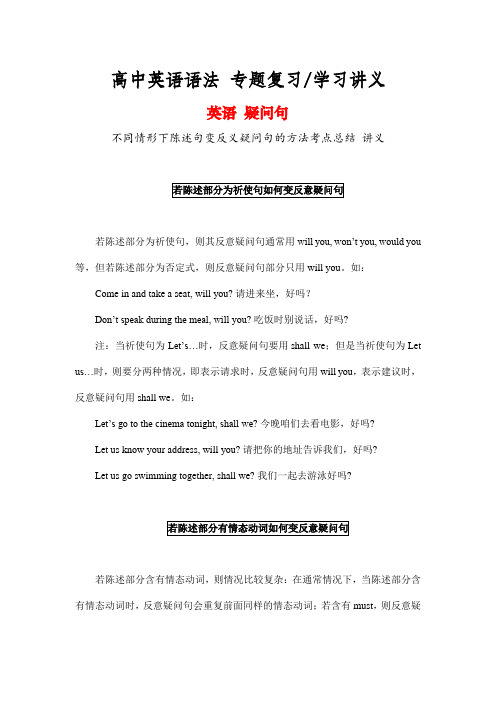
若陈述部分的主语为 somebody, someone, everyone, everybody, no one, nobody 等复合不定代词,其反意疑问句的主语在正式文体中用 he,在口语或非正式文体 中通常用 they。如:
Nobody is to blame for it, is he [are they]? 这谁也不怨,对不对? 当陈述部分的主语是 something, anything, nothing, everything 等复合不定代 词时,其反意疑问句的主语要用 it。如: Nothing is left, is it? 没有东西留下,是吗? Everything is ready, is it? 一切都准备好了,是吗?
若陈述部分有动词 have 如何变反意疑问句
若陈述部分含有动词 have,则应注意:若为助动词,反意疑问句也用 have; 若表示“所有”,反意疑问句可以用 have,也可以用 do;若表示“吃”、“玩” 等意思,反意疑问句要用 do,不能用 have;若用于 have to,则通常用加助动词 do 的形式,不过有时也可用 have(尤其是表示特定行为时)。如:
Come in and take a seat, will you? 请进来坐,好吗? Don’t speak during the meal, will you? 吃饭时别说话,好吗? 注:当祈使句为 Let’s…时,反意疑问句要用 shall we;但是当祈使句为 Let us…时,则要分两种情况,即表示请求时,反意疑问句用 will you,表示建议时, 反意疑问句用 shall we。如: Let’s go to the cinema tonight, shall we? 今晚咱们去看电影,好吗? Let us know your address, will you? 请把你的地址告诉我们,好吗? Let us go swimming together, shall we? 我们一起去游泳好吗?
句型转换反义疑问句

句型转换反义疑问句反义疑问句是英语中的一种特殊语气形式,用于提出含有情感色彩的问题,常用于肯定句、祈使句后面。
它可以通过改变原句中的疑问形式,来表达一种相反的意思。
本文将探讨句型转换反义疑问句的相关知识,以及一些实用的技巧和例句。
一、句型转换规则在转换反义疑问句时,需要改变原句的疑问部分。
一般情况下,如果原句是肯定句,反义疑问句中的疑问部分采用否定形式;如果原句是否定句,反义疑问句中的疑问部分则改为肯定形式。
同时,也需要根据主谓的人称和数目做出相应的调整。
以下是一些常见的句型转换规则:1. 当原句为肯定陈述句时,反义疑问句的疑问部分使用否定形式,并保持与原句主谓的一致。
例如:- You are a teacher, aren't you?- He can swim, can't he?2. 当原句为否定陈述句时,反义疑问句的疑问部分使用肯定形式,并保持与原句主谓的一致。
例如:- She doesn't like coffee, does she?- They won't come, will they?3. 当原句为祈使句时,反义疑问句的疑问部分使用肯定形式,并保持与原句主谓的一致。
例如:- Don't go, will you?- Keep quiet, won't you?二、句型转换技巧除了常见的句型转换规则外,还有一些技巧可以帮助我们更好地转换反义疑问句。
1. 肯定形式的反义疑问句当原句为肯定形式时,我们可以使用以下句式来转换成反义疑问句:- It looks/ seems/ appears + 肯定/否定形式,doesn't it?- You know/ understand/ remember/ realize + 肯定/否定形式, don't you?例如:- You are coming to the party, aren't you?- He knows the answer, doesn't he?2. 否定形式的反义疑问句当原句为否定形式时,我们可以使用以下句式来转换成反义疑问句:- It looks/ seems/ appears + 否定/肯定形式,does it?- You don't know/ understand/ remember/ realize + 否定/肯定形式, do you?例如:- She doesn't like chocolate, does she?- They don't live here, do they?三、例句展示下面是一些常见句型的例句展示,以便更好地理解句型转换反义疑问句的用法:1. 肯定形式的反义疑问句:- You are a student, aren't you?(你是学生,不是吗?)- She can play the piano, can't she?(她会弹钢琴,对吧?)2. 否定形式的反义疑问句:- He doesn't have any money, does he?(他没有钱,对吗?)- They don't like spicy food, do they?(他们不喜欢辣食,对吧?)3. 祈使句的反义疑问句:- Don't be late, will you?(不要迟到,好吗?)- Keep the door closed, won't you?(请关好门,好吗?)四、总结通过句型转换可以更灵活地运用反义疑问句,丰富英语表达。
反义疑问句
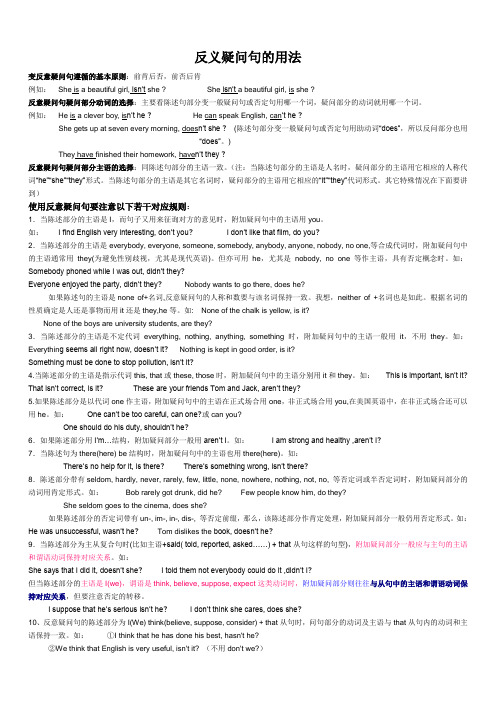
反义疑问句的用法变反意疑问句遵循的基本原则:前肯后否,前否后肯例如:She is a beautiful girl, isn’t she ? She isn’t a beautiful girl, is she ?反意疑问句疑问部分动词的选择:主要看陈述句部分变一般疑问句或否定句用哪一个词,疑问部分的动词就用哪一个词。
例如:He is a clever boy, is n’t he ?He can speak English, can’t he ?She gets up at seven every morning, does n’t she ? (陈述句部分变一般疑问句或否定句用助动词“does”,所以反问部分也用“does”。
)They have finished their homework, have n’t they ?反意疑问句疑问部分主语的选择:同陈述句部分的主语一致。
(注:当陈述句部分的主语是人名时,疑问部分的主语用它相应的人称代词“he”“she”“they”形式。
当陈述句部分的主语是其它名词时,疑问部分的主语用它相应的“it”“they”代词形式。
其它特殊情况在下面要讲到)使用反意疑问句要注意以下若干对应规则:1.当陈述部分的主语是I,而句子又用来征询对方的意见时,附加疑问句中的主语用you。
如:I find English very interesting, don’t you? I don’t like that film, do you?2.当陈述部分的主语是everybody, everyone, someone, somebody, anybody, anyone, nobody, no one,等合成代词时,附加疑问句中的主语通常用they(为避免性别歧视,尤其是现代英语)。
但亦可用he,尤其是nobody, no one等作主语,具有否定概念时。
如:Somebody phoned while I was out, didn’t they?Everyone enjoyed the party, didn’t they? Nobody wants to go there, does he?如果陈述句的主语是none of+名词,反意疑问句的人称和数要与该名词保持一致。
18种特殊反义疑问句

初中英语18种特殊的反意疑问句1.祈使句。
祈使句后一般加上will you或won't you构成反意疑问句,用will you 多表示“请求”,用won't you 多表示提醒对方注意。
例如:Look at the blackboard, will you/ won't you?看黑板,好吗?Let引导的祈使句有两种情况:1)Let's...,后的反意疑问句用shall we或shan't we。
例如:Let's go home, shall we/ shan't we? 回家吧,好吗?还可以用may I来表示征求对方的同意或许可。
2)Let us/me...后的反意疑问句用will you或won't you。
例如:Let me have a try, will you/won't you? 让我试一试,行吗?2.感叹句。
感叹句后加反意疑问句时,其反意疑问句需用be的一般现在时态的否定形式。
例如:What fine weather, isn't it? 多好的天气啊,是吧?3. 当陈述部分谓语动词是need, dare, used to,且这些词被用作实义动词时,其反意疑问句需用do的适当形式。
例如:He needs help, doesn't he?他需要帮助,是吗?4.陈述部分主、谓语是I am...时,反意疑问句用aren't I 或ain't I ,而不是am not I (可用am I not)。
例如:I'm working now, ain't I? 我在工作,是吗?5.陈述部分的主语是everything, nothing, anything或something 时,反意疑问句的主语应用代词it。
例如:Something is wrong with my radio, isn't it? 我的收音机出毛病了,是吧?6.陈述部分的主语是everybody, everyone, anybody, anyone, somebody, someone, nobody, no one, none, neither 时, 其反意疑问句的主语需用复数代词they。
祈使句如何变反意疑问句
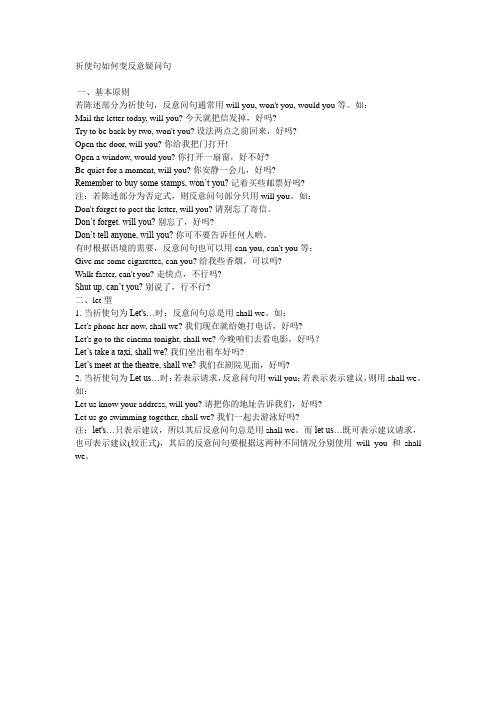
祈使句如何变反意疑问句一、基本原则若陈述部分为祈使句,反意问句通常用will you, won't you, would you等。
如:Mail the letter today, will you? 今天就把信发掉,好吗?Try to be back by two, won't you? 设法两点之前回来,好吗?Open the door, will you? 你给我把门打开!Open a window, would you? 你打开一扇窗,好不好?Be quiet for a moment, will you? 你安静一会儿,好吗?Remember to buy some stamps, won’t you?记着买些邮票好吗?注:若陈述部分为否定式,则反意问句部分只用will you。
如:Don't forget to post the letter, will you? 请别忘了寄信。
Don’t forget. will you?别忘了,好吗?Don’t tell anyone, will you?你可不要告诉任何人哟。
有时根据语境的需要,反意问句也可以用can you, can't you 等:Give me some cigarettes, can you? 给我些香烟,可以吗?Walk faster, can't you? 走快点,不行吗?Shut up, can’t you?别说了,行不行?二、let型1. 当祈使句为Let's…时:反意问句总是用 shall we。
如:Let's phone her now, shall we? 我们现在就给她打电话,好吗?Let's go to the cinema tonight, shall we? 今晚咱们去看电影,好吗?Let’s take a taxi, shall we?我们坐出租车好吗?Let’s meet at the theatre, shall we?我们在剧院见面,好吗?2. 当祈使句为Let us…时:若表示请求,反意问句用will you;若表示表示建议,则用 shall we。
祈使句如何变反意疑问句英语语法知识点

祈使句如何变反意疑问句英语语法知识点
祈使句如何变反意疑问句英语语法知识点
若陈述部分为祈使句,则其反意疑问句通常用will you, wont you, would you等。
如:
Open the door, will you? 你给我把门打开!
Open a window, would you? 你打开一扇窗,好不好?
Be quiet for a moment, will you? 你安静一会儿,好吗?
Remember to buy some stamps, wont you? 记着买些邮票好吗?
Shut up, cant you? 别说了,行不行?
另外要注意以下几点:
1. 若陈述部分为否定式,则反意疑问句部分只用肯定式will you。
如:
Dont forget. will you? 别忘了,好吗?
Dont tell anyone, will you? 你可不要告诉任何人哟。
2. 当祈使句为Lets时,反意疑问句要用 shall we;但是当祈使句为Let us时,则要分两种情况,即表示请求时,反意疑问句用will you,表示建议时,反意疑问句用 shall we。
如:
Lets take a taxi, shall we? 我们坐出租车好吗?
Lets meet at the theatre, shall we? 我们在剧院见面,好吗?
下载全文。
反义疑问句的用法和句式
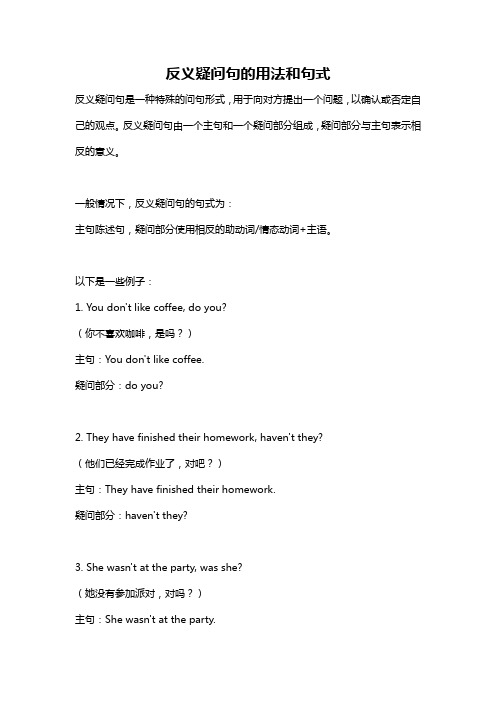
反义疑问句的用法和句式
反义疑问句是一种特殊的问句形式,用于向对方提出一个问题,以确认或否定自己的观点。
反义疑问句由一个主句和一个疑问部分组成,疑问部分与主句表示相反的意义。
一般情况下,反义疑问句的句式为:
主句陈述句,疑问部分使用相反的助动词/情态动词+主语。
以下是一些例子:
1. You don't like coffee, do you?
(你不喜欢咖啡,是吗?)
主句:You don't like coffee.
疑问部分:do you?
2. They have finished their homework, haven't they?
(他们已经完成作业了,对吧?)
主句:They have finished their homework.
疑问部分:haven't they?
3. She wasn't at the party, was she?
(她没有参加派对,对吗?)
主句:She wasn't at the party.
疑问部分:was she?
4. He can't swim, can he?
(他不会游泳,对吗?)
主句:He can't swim.
疑问部分:can he?
需要注意的是,在反义疑问句中,疑问部分的助动词/情态动词与主句的时态和人称保持一致,并使用正式陈述的词序(即将助动词/情态动词置于主语之前)。
同时,反义疑问句通常用于口语交流中,以期望得到对方的确认或否定。
反义疑问句

反义疑问句1.祈使句后加will you / won’t you 。
①用will you 多表示“请求”,用“won’t you”多表示“提醒注意”Go to the cinema, will you / won’t you?②在否定句的祈使句后不加won’t you。
2.Let’s ……后一般加shall we ?Let’s go home, shall we ?而Let us /me /him……后一般加will you ?e.g. Let him have a try, will you ?Let us have a rest, will you ?3.感叹句变反意疑问句其附加部分须用一般现在时态be的否定形式。
What fine weather, isn’t it ?How diligent the girl ( she is), isn’t she ?4.陈述部分是I am ……时,附加部分用aren’t I 或ain’t I , 而不是am not / amn’t I。
I am interested in English, aren’t I / ain’t I ?5.当陈述部分的主谓语是I wish……时,附加部分用may I。
注意前后两部分用肯定形式。
I wish to fly to the moon, may I ?6.陈述部分的主语如果是主语从句、不定式(短语)、ing (短语),附加部分的主语用it.What you need is a lot of money, isn’t it ?7.陈述部分的主语是everything, nothing, anything 或something时,附加部分的主语应用it.Something is wrong with my radio, isn’t it ?Nothing is serious, is it ?8.陈述部分的主语是everybody, anyone, somebody, no one, none, neither 时,附加部分的主语用he/ they.Everyone is here, aren’t they ?Neither side could win, could they ?No one knows about it, do they ?9.陈述部分的主语是this / that 时,附加部分的主语用it; 当陈述部分的主语是these, those 时,附加部分的主语是they. This is a beautiful picture, isn’t it ?Those are Japanese, aren’t they ?10 .there be 句型的反意疑问句的附加部分用there be 的形式。
must 的三种反义疑问句

must 的三种反义疑问句既然多数人感到麻烦我就来讲一讲must反义疑问句的用法。
你记住,must反义疑问句就三种可能:①must②needn't③变换句式下面来讲一讲他们分别的用法,一般考试就这三种可能!1、mustn't→mustmustn't在陈述句中的意思一般是不允许,禁止,所以他的反义疑问句用must或may例:You mustn't smoke here, must you?或may you?2、必须→needn't当must在陈述句中作“必须”解时,它的反义疑问句就变成needn't例:You must go now ,needn't you?3、变换句式在must表示推测,做“一定,准是”,简单的说就是must用于虚拟语气时像数学一样我们引入一个“常量”——I am sure that下面就能你那句话作为例子,我们变换一下。
He must have come yesterday. 变换句式作I am sure that he came yesterday. 好我们应该分清,反义疑问句问的应该是I am sure that 后面的从句所以,按照一般反义疑问句的规则得出结果I am sure that he came yesterday, didn't he?最后再把句子还原He must have come yesterday,didn't he?此题解答完毕。
下面是我搜索英国和美国语料库的结果:英国语料库:Davies, Mark. (2004-) BYU-BNC: The British National Corpus. Available online at /bnc.1. I was just thinking I bet that Helen was pleased then cos she must have passed, mustn't she?2. Yes. Now it must have been mustn't it, a possibility, if been there at all, that he was hiding under that bed?3. Exactly why, he must have had some sympathy, mustn't he?.4. …she must have passed mustn't she?5. He must have been interested in cooking, mustn't he?6. Yeah well I mean he must have gone in the hospital to her mustn't he?8. You must have touched her up the wrong way. --Yeah, I must have done mustn't I?9. Now it must have been mustn't it, a possibility, if been there at all, that he was hiding under that bed?10. Exactly why, he must have had some sympathy, mustn't he?.11. He must have been interested in cooking, mustn't he?12. Yeah well I mean he must have gone in the hospital to her mustn't he?13. Yeah, I must have done mustn't I?14. Somebody must have reported him, though, mustn't they?15. Abruptly she stood up and crossed to the window. "I must have done , mustn't I?"16. You must have seen the seals, though, didn't you?17. Exactly why, he must have had some sympathy , mustn't he ?.18. And your sister's ten years older than you so they must 've been there ten years plus , mustn't they ?19. They have a serious side but they must have a lighter side as well , mustn't they ?20. It must be , mustn't it ?21. Yeah. The profit would have been minus cos the costs would still be there so it must be a cancellation . Mustn'tit ?22. Yes, now this shows it must be his imagination , mustn't it ?23. …they must know there is a risk , mustn't they .24. It must mean something , mustn't it ?25. Six pairs of knickers must be enough , mustn't it , Charlie?26. Then it must be Madame V in Paris , mustn't it ?27. Everybody who sees her must love her , mustn't they , Ellen?28. But he must like her a bit , mustn't he ?29. Saturday night. Yeah? Yeah. So he must be doing well, mustn’t he?30. Yeah. Okay. So what, they mus t be staying, staying the Saturday night, mustn’t they?31. You must have seen the seals, though, didn’t you?(用didn't的只搜到这一例)美国语料库:/1. You must have enjoyed those, didn't you?2. And you must have had a name, didn't you?3. Oh Patrick, I must have told you -- didn't I?4. Must have seemed like an eternity, didn't it, holding your breath?5. Must have had three kids, did she?6. I'm sure they must be exaggerating, aren't they, Professor?7. You must have called an undertaker by now, haven't you?还是英国语料库:推断:It must mean something , mustn't it?Everybody who sees her must love her , mustn't they, Ellen?But he must like her a bit , mustn't he?Yes, now this shows it must be his imagination , mustn't it?he must have had some sympathy , mustn't he?必须:Well they must do them Sarah , mustn't they?First I must wash , mustn't I?。
反义疑问句的转换和回答

反义疑问句的转换和回答反义疑问句是一种常见的语法结构,用来表达询问者对某个情况或者事实是否坚定、确认的态度。
在英语中,反义疑问句由一个肯定或者否定的陈述句和一个与陈述句相反的简短问句构成。
反义疑问句的转换和回答需要掌握一定的规则和技巧,本文将从不同角度探讨反义疑问句的用法和回答。
一、反义疑问句的转换1. 肯定陈述句转换为反义疑问句:将陈述句中的动词改为否定形式,并且将句子末尾的逗号变为问号。
例如:陈述句:She is coming with us, isn't she?反义疑问句:She is not coming with us, is she?2. 否定陈述句转换为反义疑问句:将陈述句中的动词改为肯定形式,并且将句子末尾的逗号变为问号。
例如:陈述句:He doesn't like coffee, does he?反义疑问句:He likes coffee, doesn't he?二、反义疑问句的回答1. 一致肯定回答:如果陈述句部分是肯定的,那么简短问句部分回答时要用肯定的形式。
例如:反义疑问句:She is coming with us, isn't she?回答:Yes, she is.2. 一致否定回答:如果陈述句部分是否定的,那么简短问句部分回答时要用否定的形式。
例如:反义疑问句:He doesn't like coffee, does he?回答:No, he doesn't.3. 部分一致回答:当陈述句中的人称代词或代词不是人称代词时,回答时只需根据简短问句部分的情况确定回答。
例如:反义疑问句:It's raining outside, isn't it?回答:Yes, it is. / No, it isn't.4. 肯定回答带有肯定前提:有时候,由于上下文的关系,回答反义疑问句时带有肯定前提。
例如:陈述句:You never go to the gym, do you?回答:Yes, I do go sometimes. (表示虽然很少,但是确实有去过)三、其他特殊情况1. 使用助动词应注意时态和人称的一致。
(完整版)反义疑问句用法归纳
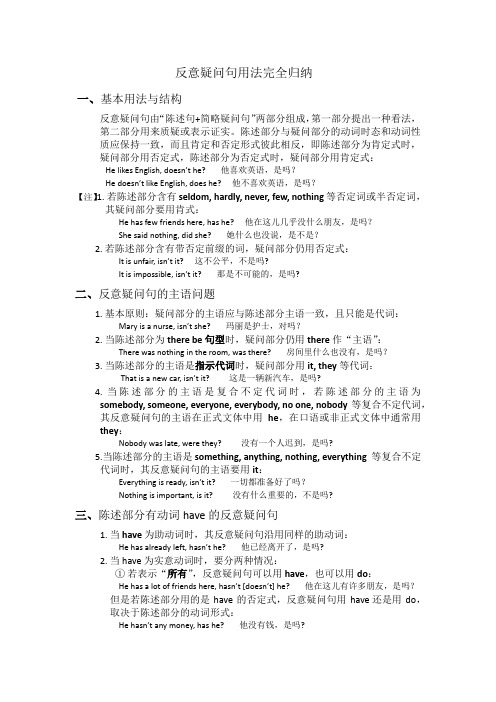
反意疑问句用法完全归纳一、基本用法与结构反意疑问句由“陈述句+简略疑问句”两部分组成,第一部分提出一种看法,第二部分用来质疑或表示证实。
陈述部分与疑问部分的动词时态和动词性质应保持一致,而且肯定和否定形式彼此相反,即陈述部分为肯定式时,疑问部分用否定式,陈述部分为否定式时,疑问部分用肯定式:He likes English,doesn’t he?他喜欢英语,是吗?He doesn’t like English,does he? 他不喜欢英语,是吗?【注】1.若陈述部分含有seldom,hardly,never,few,nothing等否定词或半否定词,其疑问部分要用肯式:He has few friends here,has he?他在这儿几乎没什么朋友,是吗?She said nothing,did she?她什么也没说,是不是?2.若陈述部分含有带否定前缀的词,疑问部分仍用否定式:It is unfair,isn’t it?这不公平,不是吗?It is impossible,isn’t it?那是不可能的,是吗?二、反意疑问句的主语问题1.基本原则:疑问部分的主语应与陈述部分主语一致,且只能是代词:Mary is a nurse,isn’t she? 玛丽是护士,对吗?2.当陈述部分为there be句型时,疑问部分仍用there作“主语”:There was nothing in the room,was there?房间里什么也没有,是吗?3.当陈述部分的主语是指示代词时,疑问部分用it,they等代词:That is a new car,isn’t it?这是一辆新汽车,是吗?4.当陈述部分的主语是复合不定代词时,若陈述部分的主语为somebody,someone,everyone,everybody,no one,nobody等复合不定代词,其反意疑问句的主语在正式文体中用he,在口语或非正式文体中通常用they:Nobody was late,were they?没有一个人迟到,是吗?5.当陈述部分的主语是something,anything,nothing,everything等复合不定代词时,其反意疑问句的主语要用it:Everything is ready,isn’t it? 一切都准备好了吗?Nothing is important,is it?没有什么重要的,不是吗?三、陈述部分有动词have的反意疑问句1.当have为助动词时,其反意疑问句沿用同样的助动词:He has already left,hasn’t he?他已经离开了,是吗?2.当have为实意动词时,要分两种情况:①若表示“所有”,反意疑问句可以用have,也可以用do:He has a lot of friends here,hasn’t[doesn’t]he?他在这儿有许多朋友,是吗?但是若陈述部分用的是have的否定式,反意疑问句用have还是用do,取决于陈述部分的动词形式:He hasn’t any money,has he?他没有钱,是吗?He doesn’t have any money,does he?他没有钱,是吗?②若表示“吃”、“玩”等意思,反意疑问句要用do:He has supper at5,doesn’t he? 他5点吃晚餐,是吗?He had a good time at the party,didn’t he?他在晚会上玩得很开心,是吗?3.当用于have to时,通常也有两种可能:若表示经常性的行为,则多用加助动词do的形式;若表示特定的行为,则多用have:He often has to get up early,doesn’t he?他经常要早起,是吗?He has to go to bed late tonight,hasn’t he?他今晚要迟睡,是吗?四、含情态动词的反意疑问句1.基本原则:在通常情况下,当陈述部分含有情态动词时,疑问部分会重复前面同样的情态动词:He can speak English,can’t he?他会说英语,是吗?We shouldn’t go,should we?我们不应该去,对不对?2.当陈述部分含有must时,要分两种情况:①若must表示“必须”或“有必要”,疑问部分用mustn’t或needn’t:You must leave at once,mustn’t[needn’t]you?你必须(有必要)马上离开,是吗?但是若陈述部分有mustn’t表示禁止,疑问部分要must:You mustn’t laugh,must you?你不准笑,知道吗?②若must表示推测,疑问部分不能用must,而应根据must后的动词结构采用相应的动词形式:He must be tired,isn’t he?他一定累了,是吗?五、陈述部分为祈使句的反意疑问句1.基本原则:若陈述部分为祈使句,疑问部分通常用will you:Please help us,will you?请帮帮我们,好吗?Come with us,will you?同我们一起去,好吗?Don’t forget to post the letter,will you?请别忘了寄信。
反义疑问句(最全)
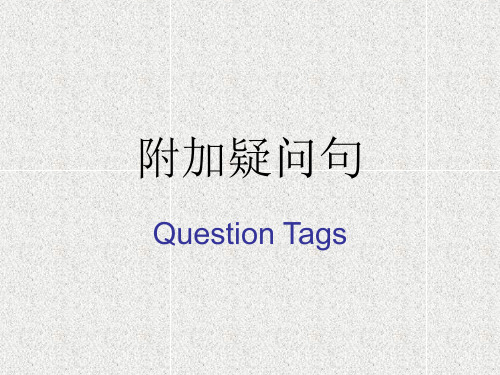
5.陈述部分有would rather +v.,疑问部分多用 wouldn’t +主语。 He would rather read it ten times than recite it, wouldn’t he? 6.陈述部分有you’d like to +v. 疑问部分用wouldn’t + 主语。 You’d like to go with me, wouldn’t you? 7.陈述部分是“there be”结构时,疑问部分用there省 略主语代词。 There is something wrong with your watch, isn't there? There will not be any trouble, will there? Note: 当为“ there used to be…”句型时,反意问句用 didn’t there。
b. 带有定语从句,宾语从句的主从复合句,疑问部分谓 语根据主句的谓语而定 He is not the man who gave us a talk, is he? He said he wanted to visit Japan, didn’t he?
c. 上述部分主句是由谓语think, believe, expect, suppose, imagine等引导的宾语从句,疑问部分与宾语 从句相对应构成bright, is he? We believe she can do it better, can't she? Note: 但此时主语必须是第一人称。如果不是,则不能否定从 句。 He thought she was wrong, didn't he? 而不能说wasn't she?
a 表示肯定推测 (一)句中陈述部分没有表示过去的时间状语,这时疑问 部分中的动词就用现在完成时。 (haven’t / hasn’t + 主语) You must have told her about it, haven’t you?
变反义疑问句的方法

变反义疑问句的方法
1. 嘿,要变反义疑问句呀,那先得明确句子的意思呀!比如说“你喜欢吃苹果”,那反义疑问句不就是“你喜欢吃苹果,不是吗?”。
2. 哎呀,注意看哦,陈述句里有 be 动词或情态动词的时候,变反义疑问句就直接用它们呀!像“他是个老师”,就变成“他是个老师,不是吗?”。
3. 哇塞,要是陈述句里没有 be 动词和情态动词,那就得用助动词啦!比如“她每天跑步”,那就得说“她每天跑步,不是吗?”。
4. 嘿呀,否定词也很关键呢!像“他不喜欢游泳”,那反义疑问句就是“他不喜欢游泳,是吗?”。
5. 哈哈,还有哦,祈使句的反义疑问句也有讲究呀!“请关门”,那就是“请关门,好吗?”。
6. 哎哟喂,句子里有不定代词的时候,那就要看情况啦!像“有人喜欢你”,反义疑问句就是“有人喜欢你,不是吗?”。
7. 呀,反义疑问句的回答也别搞混啦!人家问“你不是学生,是吗?”,你得根据实际情况回答呀!
8. 嘿嘿,一些特殊的句子也要会变哦!“这是你的书”,变成反义疑问句就是“这是你的书,不是吗?”。
9. 哇哦,多练习才能掌握得更好呀!就像“他经常迟到”,那就是“他经常迟到,不是吗?”。
10. 总之呢,变反义疑问句其实不难,多琢磨琢磨就好啦!就像搭积木一样,熟练了就很容易啦!。
反义疑问句(含解析、例句及详尽用法)

反义疑问句(含解析、例句及详尽用法)-CAL-FENGHAI.-(YICAI)-Company One1反义疑问句一、祈使句的反义疑问句1、肯定祈使句Will you/won’t you2、否定祈使句Will you3、Let的祈使句Let us ...,will you(此处Let us 表示“允许我们...”)Let’s...,shall we (此处Let’s表示“让我们...吧”)Let + 第三人称...,will you二、Must的反义疑问句1、表示“必须” musn’t /needn’tEg. You must go now, needn’t you2、表示“不准”Eg. You musn’t smoke here, must/may you3、表示推测,肯定。
(I’m sure + 从句)Eg. You must be hungry now, aren’t youI’m sure you are hungry now, aren’t youShe must have heard about that, hasn’t sheI’m sure you have heard about that, haven’t youYou must have watched that movie last night, didn’t you(last nigh为具体时间点,所以用一般过去式)三、主语(反义疑问句)+从句主句:I(don’t)think/believe/consider/suppose 或 I’m afraid/sure...后跟从句时,可将从句部分进行反义疑问Eg. I don’t think he will win, will heI think he will win, won’t heShe thinks he will win, doesn’t she(当主句主语不是I时不适用于该用法,此句中的翻译疑问针对的是主句而非从句)四、当句中包含有表示否定意义的副词或不定代词时,反义疑问句用肯定形式Eg. Nothing happened to him, did itIt is unfair, isn’t itHe dislikes watching TV, doesn’t he(该句中含否定意义的是动词而非副词或不定代词,因此不适用于该用法,反义疑问句仍然使用否定形式)五、反义疑问句的回答反义疑问句的回答针对被提问部分的谓语动词,且与回答句前部分的Yes和No 保持一致Eg. A: You haven’t lost the ticket, have youB: D I know it’s hard to get another one at this moment.A. Yes, I haven’tB. No, I haveC. I hope soD. I’m afraid not六、陈述部分的主语与反义疑问句主语保持一致的情况1、OneEg. One can’t be too careful when driving a car, can one/he一个人在开车的时候再怎么小心也不为过。
反意疑问句
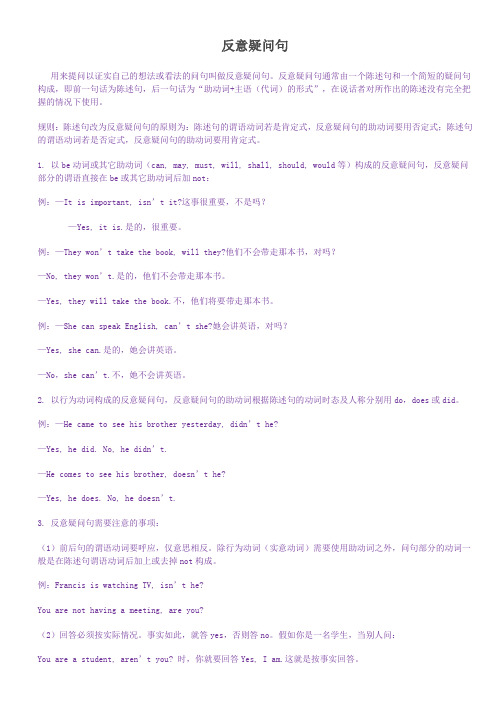
反意疑问句用来提问以证实自己的想法或看法的问句叫做反意疑问句。
反意疑问句通常由一个陈述句和一个简短的疑问句构成,即前一句话为陈述句,后一句话为“助动词+主语(代词)的形式”,在说话者对所作出的陈述没有完全把握的情况下使用。
规则:陈述句改为反意疑问句的原则为:陈述句的谓语动词若是肯定式,反意疑问句的助动词要用否定式;陈述句的谓语动词若是否定式,反意疑问句的助动词要用肯定式。
1. 以be动词或其它助动词(can, may, must, will, shall, should, would等)构成的反意疑问句,反意疑问部分的谓语直接在be或其它助动词后加not:例:—It is important, isn’t it?这事很重要,不是吗?—Yes, it is.是的,很重要。
例:—They won’t take the book, will they?他们不会带走那本书,对吗?—No, they won’t.是的,他们不会带走那本书。
—Yes, they will take the book.不,他们将要带走那本书。
例:—She can speak English, can’t she?她会讲英语,对吗?—Yes, she can.是的,她会讲英语。
—No,she can’t.不,她不会讲英语。
2. 以行为动词构成的反意疑问句,反意疑问句的助动词根据陈述句的动词时态及人称分别用do,does或did。
例:—He came to see his brother yesterday, didn’t he?—Yes, he did. No, he didn’t.—He comes to see his brother, doesn’t he?—Yes, he does. No, he doesn’t.3. 反意疑问句需要注意的事项:(1)前后句的谓语动词要呼应,仅意思相反。
除行为动词(实意动词)需要使用助动词之外,问句部分的动词一般是在陈述句谓语动词后加上或去掉not构成。
反义疑问句

特殊的反义疑问句1.Sit down and have a cup of tea ,will you? \ won't you ?Don't be late again, will you ?2.Let's have a rest, shall we? \ shan't we? \ OK?Let us go home now, will you? \won't you?Let meLet him3.What a beautiful girl ,isn't she ?4.I'm quite tall, aren't I?5.Something is wrong with my radio, isn't it?Nothing is serious, is it ?6.Everybody likes Beijing, don't they?Nobody wants to go swimming , does he ? \ do thay ?Neither of them is right, is he ? \ are they ?7.This is my ruler, isn't it ?Those are their books , aren't they ?8.One should do one's duty, shouldn't one?One cannot always do one's duty , can you ?9.What you need is more practice, isn't it ?To learn English well isn't easy ,is it ?Swimming is great fun, isn't it ?10.I wish to go home ,may I ?I wish I were you , may I ?11.He said that it was worth doing ,didn't he ?She said that her father had gone to America , didn't she ?I think he will be back in an hour , won't he ?I don't suppose you are serious , are you ?12.We must study English hard or we can't be good at it , can we ?He is a teacher but his wife is a nurse , isn't she ?13 当must 表示“必须”时,He must work hard next term , mustn't he ?当must 表示“必要”时,They must renew the books , needn't they ?当must 表示“推测”时,She must be very tired , isn't she ?You must have been to Huangshan ,haven't you ?14.You'd better come back early ,hadn't you ? \ shouldn't you ?You'd like to go there , wouldn't you ?You'd rather15.--Tom told me he saw a ghost last night ?-- He did , did he ?-- You mustn't listen to his story .-- Oh , I mustn't , mustn't I ?主谓一致一,谓语动词用单数1.either, neither ,one ,each (of) ,every (of) ,作主语或修饰主语时E.g. Every silver knife ,fork ,spoon has to be counted .2. everybody ,everyone ,everything ,no one ,no body ,anyone等不定代词,what ,whoever 等作主语3.不定式,动名词,从句作主语时谓语动词单数To see is to believe .Singing and dancing are their greatest pleasure .4.国家,机构,书刊,事件名称等作主语:The United Nations was founded in 1945.5.并列主语指同一事物时Ice cream and cake is what she wants after dinner .6.many a + 单数名词(表示许多)Many a student wants to apply for the scholarship .7.mathematics ,measles ,physics ,politics ,news二.谓语动词用复数1.both, few, many, several ,a number of ,the majority of 作主语或修饰主语2.用and 或both...and...连接的两个不同事物The manager and the secretary of the firm are very able man .The editor and publisher of the newspaper is a very able man .3.某些集合名词:few ,people ,the rest ,cattle ,police 等作主语4.正式语中,one of those + 复数名词+ 定从(谓语复数) Jane is one of those persons who always think they are right.the only one of +单数名词+ 定从(谓语单数)三.谓语动词有时单数有时复数1.a good many ,a number of + 复数名词a good deal + U2.family ,army ,class ,crowd ,herd ,public ,group, party ,committee, company ,government ,team等表整体--单数表成员--复数Class 2 is having English class . Class 2 are playing on the sports ground.3.Chinese ,Japanese ,English , French 指语言-- 单数指人民-- 复数4.时间,金钱,距离,体积等作主语---V.单数Twenty dollars is too expensive .表具体的、个别的单位--复数The last two years have been very difficult for us .真题1.In the coming summer holidays,my family ___ going to take a one-week trip to Qingdao.A.isB.areC.wasD.were2.___ pretty your dress is !Where did you get it ?A.HowB.How aC.WhatD.What a3.--There is enough food for the birds ,isn't ____?--No. We need to get some.A.itB.thereC.thatD.this4.--Your monitor id never late for school , is he ?--____.He always comes to school earlier than others .A.Yes ,he is .B.No,he isn'tC.Yes,of courseD.No,sometimes5.--_____ ?--He thinks China is great .A.What does your father think of China ?B.What does your father like in China ?C.Does your father like China ?6.--The film "Hoot"(拯救猫头鹰)is on at the movies .Let's go to see it ,____?--Ok. Let's go .A.will youB.shall weC.won;t weD.don;t you7.Lily is away .She ,with her mother ,____ to Zhalong to see birds .A.has goneB.have goneC.has been8.-- How many teachers are there in your school ?-- About 200. One third of them ___ men teachers.A.haveB.hasC.areD.is9.In our school library there ___a number of books on science and the number of them___growing larger and larger .A.is; areB.are; isC.has ;isD.have ;are10.Nothing is difficult in the world if you put your heart into it ,_____?A.aren't theyB.isn't itC.are theyD.is it。
含情态动词反义疑问句

We ought to leave at once, oughtn’t we?
We ought to leave at once, shouldn’t we?
6. ought to反意疑问句附加部分用 ought 或 should
3. had better 时, 反意疑问句附 加部分用 shouldn’t / hadn’t
He would rather read the text ten times than recite it, wouldn’t he?
You'd like to have some bananas, wouldn’t you?
11. 定语从句,根据主句谓语动词 定
He is not the man who will give us a lecture, is he ?
12. 宾语从句中,以主句为准. 但如果主语是第一人称且谓语动词是think, believe,
guess, suppose 时, 以从句为准.
You told them he wouldn't come, didn’t you? She never said he was a good student,did she?
Everything is ready, isn’t it.
10. 并列复合句中,反义疑问句用 就近原则。
Tom loves Lucy, but she loves Jack, doesn’t she?
Lucy loves Tom, but he loves Jack, doesn’t he?
Jack has to go there on foot, doesn’t he?
- 1、下载文档前请自行甄别文档内容的完整性,平台不提供额外的编辑、内容补充、找答案等附加服务。
- 2、"仅部分预览"的文档,不可在线预览部分如存在完整性等问题,可反馈申请退款(可完整预览的文档不适用该条件!)。
- 3、如文档侵犯您的权益,请联系客服反馈,我们会尽快为您处理(人工客服工作时间:9:00-18:30)。
( )1. ----How is everything going with you? ----- _______.A. All right, thanksB. That’s right, thank youC. How are you?D. How do you do?( )2. Y ou look _________, What’s wrong ?A. happyB. worriedC. excitedD. healthy( )3. It’s polite to say ______ to others when you leave.A. helloB. thanksC. sorryD. goodbye( )4. Changjiang River is one of ________ in the world.A. the longest riverB. the longest the riversC. the longest riversD. the longer rivers( )5. One of us ________ from Hechuan.A. comeB. comesC. is comingD. came( ) 6. The Greens _________ to Canada next week.A. is going backB. is returning backC. are going backD. are returning back( )7. Of the twins, Lucy is ________.A. tallerB. the tallerC. the tallestD. tallest8. There is little water in the bottle. (变反意疑问句) There is little water in the bottle, _________ _________?9. When were you born? Can you tell me? (合并为一句) Can you tell me when ___________ ________ born?10. He is a very handsome man.(感叹句) _________ ________ handsome man he is! / __________ __________ he is!11. I think he has nothing to eat, _______ _________?(变反意疑问句)12. She often comes to help us. (对划线部分提问)__________ does she often _________?13. They exercise two hours a day. (对划线部分提问) _______ ________ do they exercise a day?*14. “Come here.” The policeman said to the man. () The policeman told the man ______ _______ there.P21. I spend 30 minutes on Chinese every day.(变同义句)(1) I _________ 30 minutes ___________ Chinese every day.(2) It ________ me 30 minutes to _________ Chinese every day.2. She spent 300 yuan on the watch.(变同义句)(1) She ______ the watch _____ 300 yuan.(2) She ______ 300 yuan _____ the watch.3. I am going to Michael’s house this evening.(变一般疑问句)_______ _______ going to Michael’s house this evening?4. --- Were you at Michael’s last night, Jane?(作肯定回答) --- Y es, ______ _____.5. How did she come here yesterday? I don’t know. (合并为一句)I don’t know how __________ ___________ here yesterday.6. She is very beautiful. (感叹句) ___________ ___________ she is!7. I have few friends here. (变反意疑问句) I have few friends here, __________ ___________?( ) 8. She is so happy that there _____ on her face.A. is a smileB. is a big smileC. are all smilesD. both B and C( )9. She is ______ in the ______ movie.A. interesting, interestingB. interested, interestedC. interested, interestingD. interesting, interested( ) 10. _______ news! We all feel excited.A. What a goodB. How good aC. What goodD. How good( )11. The boy ________ a white T-shirt is waiting _________ a bus stop.A. for, forB. of, onC. on, ofD. in, at( ) 12. His father ______ football, but he is______ basketball.A. like, interested inB. is interested in, likeC. is fond of, interested inD. interests in, fond of( )1. She feels_______, because she lost her pen.A. happyB. unhappyC. activeD. excited( )2.Y ou don’t look ________. What’s wrong?A. wellB. goodC. tiringD. moving( )3. She was late ________ the bus this morning.A. atB. toC. forD. with( )4. Y ou should get a ticket ________ boating first.A. toB. atC. withD. for( )5. They _______ us and ______ the match.A. won, wonB. beat, beatC. beat, wonD. won, beat( )6. Tom is only 3. He isn’t _______ to go to school.A. too youngB. so youngC. enough oldD. old enough( )7. Mr. Huang often makes us ________ notes.A. to copyB. copyingC. copyD. copied8. I spend half an hour on English every day. (变同意句)It ___________me half an hour to _________English every day.9. We watched an exciting match yesterday, ______________ _____________? (变反意疑问句)10. They work very hard..(感叹句) ___________ ___________ they work.11. Is she from Canada? I’m not sure.(合并为一句)I’m not sure ____________ she ____________ from Canada.P4( ) 1. Kate, you’d better _________supper, I have ________ food already.(已经)A. prepare, preparedB. prepare for, prepared forC. prepare, prepared forD. prepare for, prepared( ) 2. She said Tom ______ school yesterday.A. isn’t atB. doesn’t come toC. didn’t come toD. won’t come( ) 3. That sounds ______.A. a good ideaB. like a good ideaC. like a ideaD. like good( ) 4. Nobody ________ who she is.A. knewB. knowsC. knowD. is knowing( ) 5. Y ou don’t look ________. What’s wrong?A. healthyB. healthyC. healthilyD. healthier( ) 6. ________ news! We all feel sad!A. How goodB. How bad aC. What badD. What a good( ) 7. Don’t make other __________ for long.A. waitingB. waitC. to waitD. waited( ) 8. Mike ______ to bed until 12 o’clock last night.A. wentB. didn’t goC. goesD. doesn’t9. Jim came to China after he finished his high school. = Jim ________ come to China ______ he finished his high school.10. I can look after myself well. = I can _____ ______ myself well. = I can _____ ______ care of mysel11. She is very kind. She helps me a lot. (合并为一句)It is very kind ________ __________ to help me a lot.12. He is a cool boy. (感叹句) _________ _______ cool boy he is!13. He is never late for school, _________ __________?(变反意疑问句)14. Kate will leave for USA in three days.(对划线部分提问)_________ __________ will Kate leave for USA?( )1. We are both happy to be with ________.A. each otherB. othersC. anotherD. the other( )2. I met Mr. Lee on the way _______.A. to hereB. schoolC. to thereD. home( )3. Most old people are afraid ________.A. to lonelyB. to be lonelyC. of being lonelyD. of lonely( )4. Mr. Fat is too fat _________.A. to run fastB. that can’t run fastC. can run fastD. can’t run fast.( )5. The girl ________ Lucy.A. is callB. is callingC. is calledD. called( )6. Will you please ________ eat in class?A. notB. not toC. don’tD. be not( )7. So _______ homework really make the students feel tired.A. muchB. manyC. littleD. few( )8. It’s true that every student _______ to having a good future.A. hopesB. look forwardC. wishesD. wants9. We are living in a city called Chongqing.= We’re living in a city _________ Chongqing.=We’re living a city _______ ______ _______ Chongqing.10. He runs so fast that he can catch a horse.= He runs ________ ________ to catch a horse.11. Jane is a very lovely girl. (感叹句) __________ __________ lovely girl Jane is!12. John went to Shanghai last week, __________ _________? (变反意疑问句)13. A re they from Cuba? I’m not sure.(合并为一句)I’m not sure __________ they __________ from Cuba?P6( )1. We are happy to be with _____.A. each otherB. othersC. anotherD. the other( )2. I met Mr. Lee on the way _______.A. to hereB. to schoolC. to thereD. to home( )3. We are all afraid ________.A. to that lonely houseB. to go to that lonely houseC. of going to that lonely houseD. of that lonely house ( )4. Mr. Fast runs so fast __________easily.A. to stopB. that he can’t stopC. can stopD. can’t stop.( )5. The girl _________ Lucy is my best friend.A. is callB. is callingC. is calledD. called( )6. Please don’t eat in class,___________?A. will youB. shall weC. don’t youD. do you7. Both Jim and I are in Class 9. (否定句) ________ Jim _________ I am in Class9.8. He jumps so high that he can catch the flying bird . = He jumps ________ ________ to catch the flying bird.9. Michael works very hard at Chinese. (感叹句) _________ _________ Michael works!10. How can I get there?Can you tell me? (合并为一句)Can you tell me how ________________ get there?11. It’s twenty minutes’ bike ride to our school from here.(对划线部分提问)________ _________ is it to our school from here?12. Grandpa lived in the countryside for 70 years. (对划线部分提问)_________ _________ did Grandpa live in the countryside?( )1. China is an old country ______ a history of 5000 year.A. hasB. haveC. withD. with out( )2. The box is heavy. It’s ________ apples.A. full withB. fill withC. filled ofD. full of( )3. Beijing Opera is popular _______ most old people in Beijing.A. withB. inC. amongD. both A and C( )4. She feels lonely because she has _______ friends here.A. a fewB. a littleC. fewD. little( )5. We are afraid ________ our lives.A. of loseB. to loseC. of losingD. to losing( )6. ______ weather! We have to stay at home.A. What a badB. What a goodC. What badD. How bad( )7. The lonely father often became angry ________ the noisy children.A. because ofB. becauseC. sinceD. for( ) 8. She _______ her mother _______ singing.A. like, likesB. likes, likesC. is like, is likeD. like, like( ) 9. --- Would you like coffee or tea? --- ________. I’d like a glass of water.A. BothB. EitherC. NeitherD. All10. She bought some eggs yesterday.(否定句) She __________ __________ any eggs yesterday.11. Helen likes hamburgers very much.(感叹句) _________ _________ Helen likes hamburgers!12. Jack is old. Mike is older. (合并为一句) Mike is _________ ________ Jack.P8( )1. I met Mr. Lee on the _____.A. road to schoolB. way schoolC. way homeD. street there( )2. _______ the end, he got there on time.A. InB. OnC. AtD. To( ) 3. I hope everything _______.A. go wellB. come goodC. goes wellD. comes good( )4. She felt very tired so she decided to ________.A. works lateB. sleep lateC. go to bed lateD. get up early( )5. Many love stories _______ happiness.A. endB. ends withC. end atD. end with( )6. ________ news. We’re all excited at it.A. How goodB. What a goodC. How goodD. What good( )7. It takes me half an hour_________ to school.A. gettingB. to reachC. to getD. arrive( ) 8, Mr. Huang teaches _________ English.A. ourB. usC. weD. ours9. She went to bed after her mother came back..= She ________ go to bed ________ her mother came back.10. Can she speak English? I don’t know. (合并为一句)I don’t know __________ she _________ speak English.11. Lets’ take the blue one, ________ ________? (变反意疑问句)12. She bought some eggs yesterday. (对划线部分提问) What ________ she _________ yesterday?13. Children are too young. They shouldn’t smoke. = Children are __________ young _________ smoke.14. Maria comes here by taxi. (对划线部分提问) __________ __________ Maria come here?( )1. She _______ to bed until 12.p.m last night.A. wentB. goesC. didn’t goD. doesn’t( )2. Mr. Huang is strict_______ us _______ our study.A. in, inB. with, withC. in, withD. with, in( )3. -----What’s your English teacher like? ----- ________.A. InterestingB. BoringC. StrictD. A,B and C( )4. Many girls are always worried ________ fat.A. aboutB. toC. about becomingD. to being( )5. She lost her ID card and she didn’t know ______ next .A. how to doB. what to do itC. what to doD. how do it( )6. She has no friends to _______.A. talkB. talk aboutC. PlayD. talk to( )7. He did _______ in the English exam, she felt very blue.A. wellB. goodC. badlyD. bad8. It seems that he is a teacher.=_______ seems _______ ________ a teacher.9. Are you tired? Mother asked me. (合并为一句)Mother asked me ________ I ________ tired.10. The students are working hard. (感叹句)________ ________ the students are working!11. Jack will come back in four days. (对划线部分提问)_________ _________ will Jack come back?P10( )1. Don’t be angry _______ me _______ using your pen.A. with, withB. at, atC. with, atD. at, with( )2. I’m mad at _________ boys.A. criesB. criedC. cryD. crying( )3. She is worried about ___________ her classmates.A. falling behindB. fall behindC. to fall behindD. falls behind( )4. Sally is very lazy, she is even tired ______ a bit of homework.A. aboutB. ofC. withD. in( )5. Mr. Lee is very strict ______ us _________ everything.A. about, aboutB. with, withC. about, withD. with, about( )6. Jane has fallen behind. She is ________ catching up with her classmates.A. worried aboutB. anxious aboutC. nervous aboutD. strict about( )7. I have no friends to ___________.A. talk aboutB. play withC. write withD. ask help8. Mother got angry with the noisy children.= Mother got _________ _________ the noisy children.= Mother got angry ____________ _________ the noisy children.9. Y ou’d better take a bus. (否定句) Y ou’d ___________ __________ take a bus.10. She often helps the poor and the old.(对划线部分提问) What ________ she often ________?11. What did Jack buy yesterday? She asked me. (合并成一句)She asked me ________ Jack ________ yesterday?12. I spent 100 yuan on this dictionary. (对划线部分提问)How ________ __________ you spend on this dictionary?13. I think she is from Japan, __________ __________? (反意疑问句)( )1. I didn’t pass the exam _________ the pirated book.A. becauseB. because ofC. sinceD. for( )2. It’s _________ to talk with children.A. boredB. interestedC. interestingD. well( )3. Sorry, I can’t help you, but you may ask _______.A. other someoneB. somebody otherC. else someoneD. somebody else( )4. He often makes face and makes us _________.A. laughB. to laughC. laughingD. laughed( )5. Y ou can take a walk before__________ to bed.A. you will goB. to goC. goingD. went( )6. Everyone gets these feelings ___________ your ageA. inB. atC. withD. on7. We all got these feelings when we were as old as you.= We all got these feelings _________ your ___________.8. I don’t know how I can get other students to talk with me.=I don’t know ___________ _________ get other students to talk with me9. He feels very terrible. (变感叹句) __________ _________ he feels.10. Is Michael at home? Jim asked.(合并成一句)Jim asked __________ Michael _______ at home.11. His mother cooks at home very day, __________ __________? (变反意疑问句)12. I think she has some money. (变否定句) I _________ think she has __________ money.P12( )1. Are you feeling __________better now?A. someB. anyC. someD. many( )2. We had much fun _________in the mountain yesterday.A. to hikeB. hikesC. hikingD. hiked( )3. Do you want to __________ the high jump?A. joinB. join inC. take part inD. take part( )4. I’m so busy, can you give me __________.A. a handB. handsC. a messageD. messages( )5. Can you give me some ____________ on my problem?A. advicesB. suggestionC. suggestionsD. advise( )6. It’s normal to feel sad when ___________ happens to us.A. something happyB. unhappy somethingC. something badD. bad something( ) 7. She _____ pop music while her mother _______ classical music.A. like, fond ofB. is interested in, likesC. is fond of, is interested inD. Both B and C( ) 8. Doing sports _______ good for us.A. isB. wasC. areD. were9. This girl is very lovely. (感叹句) _________ _________ lovely girl this is!10. She lost her mother in her teens.= She lost her mother __________ she was a ____________.11.Both Jim and Jane are right.(变为否定句) ______________ Jim ____________ Jane is right.12. What’s wrong with her? = What ____________ ____________ with her?13. Are they good friends? I’m not sure.(合并为一句) I’m not sure __________ they _________ good friends.14. She didn’t come to school because she was ill. (对划线部分提问) _________ __________ she came to school?15. I felt excited when I go to the theater. (对划线部分提问) _______ ________ you feel when you got to the theater?( )1. Was she ill, _____?A. eitherB. alsoC. tooD. as well( )2. Y ou may sit on ____________ side of the boat.A. bothB. everyC. eachD. either( )3. He is new, He should ____________ the life here.A. used toB. get usedC. get used toD. use( )4. The weather in Chongqing isn’t as _________ that in Qingdao.A. cooler thanB. cooler asC. cool asD. cooler( )5. ________ friends he has!A. What manyB. How manyC. How many aD. What a many( )6. Please give my _________ your parents.A. good wishB. good wishesC. best wishesD. best wish( )7. I have _________ problems in this new school.A. such muchB. so muchC. such manyD. so many8. What a beautiful girl she is!= _________ beautiful ________ girl she is!9. The food here is not as delicious as our Sichuan food. = Our Sichuan food is ________ delicious _________ the food here.10. The boy looks really cool in the overcoat. (变感叹句)__________ __________ the boy looks in the overcoat!11. Shall we start at once? I want to know. (合并成一句) I want to know __________ we __________ start at once.12. Let’s begin our class, ___________ ____________?(反意疑问句)P14( )1. She is shy, her face ____ red when she speaks to a stranger.A. getB. becomeC. goD. turns( )2. The desks of our class are newer than _______ of Class 9.A. onesB. thatC. themD. those( )3. I want to live as _________ as before.A. happyB. happilyC. goodD. better( )4. Jim sits between Tom and _________.A. meB. myC. mineD. I( )5. Sally has longer hair than _________.A. MariaB. Maria’sC. Maria’s hairD. Marias’( )6. She has __________ with her English.A. so much problemB. such much problemC. so many problemsD. such many problems( ) 7. There are many trees on _________ side of the river.A. bothB. everyC. eitherD. all8. Jim is the tallest in his class. = Jim is __________ __________ any other students in his class.=__________ _________ is as tall as Jim in his class.9. Jim runs very fast. (变感叹句) ____________ _______________ Jim runs!10. Is there anything I can do for you? Can you tell me?(合并成一句)Can you tell me __________ there __________ anything I can do for you?11. Don’t play with the cat, ___________ _________?(反意疑问句)12. Let’s go shopping? = _________ __________ going shopping?13. There is going to be a sports meeting in our school? = Our school ________ ________ a sports meeting.14. She goes back to her hometown every two years. (对划线部分提问)___________ __________ does she go back to her hometown?15. He will return to China in two days. (对划线部分提问)( )1. How will you __________ these rubbish?A. do withB. do withoutC. deal withD. deal without( )2. His brother ___________ a car accident.A. is killedB. was killedC. are killedD. killed( )3. He goes to movies instead of ___________ at home.A. to stayB. stayingC. staysD. stayed( )4. Jeff decided ___________.A. stop to be angryB. stop being angryC. to stop to be angryD. to stop being angry( )5. She lives alone, but she has a __________ life.A. lonelyB. sadC. happyD. unhappy( )6. He tries to enjoy ___________ with his friends.A. beB. to beC. beingD. is( )7. He often hurt his parents ____________ angry all the time.A. with beB. with beingC. by to beD. by being8. I didn’t pass the math exam last time. = I _________ ____________ pass the math exam last time.9. He doesn’t stay in his room, he goes to movies instead.= He goes to movies instead ________ ____________ in his home.10. Chongqing is a very beautiful city.(变感叹句) _________ _________ beautiful city Chongqing is!11. Does she like a drink? The waiter asks.(合并成一句) The waiter asks _________ she ________ a drink.12. Let us have a rest, ________ _________? (反意疑问句)P16( )1. It’s no polite to ______ the old.A. shout toB. call out atC. shout atD. call( )2. He works very hard because he is worried _____ behind.A. to fallB. at fallingC. about fallingD. falling( )3. I’m angry ________ others _________ using my things.A. with, atB. at, withC. at, atD. with, with( )4. The father is ___________ the noisy children.A. tired ofB. tired aboutC. bored withD. Both A and C( )5. The roads here are not as clean as ________ in our hometown.A. itB. themC. oneD. those( )6. There is a tree __________ our house.A. in the front ofB. in front ofC. at the front ofD. at front of( )7. _________ will you do with these old clothes?A. HowB. WhatC. WhyD. When( )8. It’s 24℃to day, It’s quit warm ______ winter.A. toB. forC. withD. in( ) 9. It’s no use _________ much without doing anything.A. talkB. to tellC. sayingD. spoke10. The pizza is very delicious.(变感叹句) ________ __________ the pizza is!11. When were you born. I don’t know(合并成一句) I don’t know when _________ _________ born.12. Let’s have a rest, _________ ___________? (反意疑问句)13. His mother cleans the house every day. (对划线部分提问) _________ does his mother __________ every day?14. He is the tallest of the three. = The other two aren’t _________ tall _____________ him.15. I was angry with the crying boy.= I was ____________ ___________ the crying boy.16. She thinks I love her, ___________ __________ (反意疑问句)( )1. She is learning English _____________.A. on TVB. on the TVC. on InternetD. on radio( )2. If we ____, we’ll come over to see you again.A. will have timeB. have timeC. are freeD. Both Band C( )3. I’m nervous about the test ____________ the end of the month.A. atB. inC. on D .with( )4. That’s very nice ____________ you to help me.A. forB. toC. ofD. with( )5. --- Are you feeling _________ better? --- No, I’m feeling even __________.A. much, illB. some, worstC. a lot, betterD. any, worse( )6. I usually stay at home instead of ___________ outside.A. playing sportB. play sportsC. playing sportsD. to play sports( )7. I heard you ______ a high fever.A. haveB. hasC. to haveD. had8. Please take good care of yourself.= Please ____________ _____________ yourself well.9. It seems that you are wrong.= Y ou ____________ to _____________ wrong.10. The cookie tastes so wonderful. (变感叹句) ________ ____________ the cookie tastes!11. What did they eat this morning? Could you tell me?(合并成一句)Could you tell me what __________ ___________ this morning?12. There is a little water in the glass, ________ _________? (反意疑问句)P18( )1. Michael feel better, We’re all feel ______________ him.A. sad forB. worried aboutC. happy forD. angry at( )2. Many things can make our ____.A. feeling to changeB. feelings to changeC. feeling changeD. feelings change( )3. Bad moods are bad _________ our health.A. toB. atC. forD. with( )4. Her coming at last ___________ to us all.A. surpriseB. is surprisedC. is a surpriseD. surprised( )5. The America film is _____________ Chongqing.A. putting onB. onC. put on inD. on in( )6. There’s something wrong with my car, it ____________.A. won’t beginB. begins easilyC. won’t startD. didn’t start( )7. Teacher is _____________ the new lesson while we are__________ the exam.A. preparing, preparing forB. preparing for, preparingC. preparing, preparingD. preparing for, preparing for ( ) 8. I felt my heart ________ fast.A. beatB. beatingC. to beatD. beaten9. Sadness isn’t good for our health.= Sadness ___________ _______________ for our health.10. Lucy is a very kind girl.(变感叹句) _______ ________ kind girl Lucy is!11. Is that your book? Could you tell me?(合并成一句)Could you tell me __________ that _________ your book?12. There is little water in the glass, ________ _________? (反意疑问句)13. The girl in a red skirt is Lucy. (对划线部分提问) __________ __________ is Lucy?14. The girl is in a red skirt. (对划线部分提问) _________ ________ the girl in?15. We think he can pass the exam,___________ _____________?(反意疑问句)( )1. I don’t know this word, I have to ____________ in a dictionary.A. look up itB. look for itC. look it upD. look it for( )2. I was born _________ the evening of February 19th, 1971.A. duringB. inC. atD. on( )3. I feel _________ lonely _____________ my eyes are full of tears.A. so, thatB. such, thatC. too, toD. enough, to( )4. She often wakes up _________ midnight.A. inB. atC. onD. among( )5. I _____________ at once.A. hope you to startB. hope to startC. wish to startD. Both B and C( )6. I often meet him on my way _____.A. schoolB. to hereC. to thereD. home( )7. I saw him ______________in the room just now.A. goB. goingC. goesD. went8. She is too young to go to school. = She is _________ young that she ___________ go to school.=She isn’t __________ __________ to go to school.9. Kangkang is really handsome.(变感叹句) _________ ___________ Kangkang is!10. Was your mother at home yesterday? I don’t know.(合并成一句)I don’t know _________ your mother ________ at home yesterday.11. There are little sheep on the road. _________ __________? (反意疑问句)P21-22( )1. Our clothes can make us feel better ________ ourselves.A. atB. aboutC. withD. on( )2. If we aren’t feeling our best, we can always _________ some clothes of different colors.A. try onB. try toC. try aboutD. try out( )3. I __________ to live in the suburb some day.A. hopeB. wishC. wantD. A,B and C( )4. I saw a snake ___________ across the road.A. layB. lieC. lyingD. lies( )5. Women teachers have a rest ___________ the afternoon of March 8th .A. inB. onC. atD. between( )6. The bus can’t move ______________.A. any moreB. any longerC. no longerD. both A and B( )7. Our choice of colors ____________how we are feeling.A. showsB. showC. showedD. is showing( )8. This skirt is beautiful. May I ______________.A. try it onB. try on itC. try it outD. try out it9. She doesn’t live her any more.= She ______________ ______________ lives here.10. It seems that she is ill. = _______ _______ to be ill.11. Kangkang is really a handsome boy. (变感叹句) ___________ ________ handsome boy Knagkang is!12. Where did you go just now? Can you tell me? (合并成一句)Can you tell me ______________ you ________________ just know?13. Jim is unhappy today, ___________ __________?(反意疑问句)14. It’s half an hour’s ride away. (对划线部分提问) __________ _________ is it?15. They think she is wrong,_________ ___________? (变反意疑问句)( )1. Some Programs on TV make me __________ sleep.A. wantB. to wantC. to want toD. want to( )2. ________ time to relax and exercise every day.A. SpendB. CostC. PayD. Take( )3. If we’re in good health, we can work in ____________.A. high spiritB. low spiritC. high spiritsD. low spirits( )4. Talking with others can make you feel ____________.A. more lonelyB. less lonelyC. more aloneD. less alone( )5. It’s important _____________ us to keep healthy.A. ofB. forC. withD. at( )6. It’s kind _____________ you to help me.A. ofB. forC. withD. at( )7. _________ some clothes of different colors, if you aren’t feeling our best.A. Try outB. Try onC. Try offD. Try at( )8. ____________ before making important decisions.A. Think of itB. Think about itC. Think them overD. Think them about9. Get back to your daily activities.= ____________ to your daily activities.10. Jack is very interested in English. (变感叹句) __________ ___________ Jack is in English!11. What did he buy yesterday? Could you tell me. (合并成一句)Could you tell me _________ he ___________ yesterday?12. My mother ate nothing this morning, __________ __________? (反意疑问句)P25( )1. There ___________ some exciting news in today’s newspaper.A. amB. isC. areD. was( )2. We’ll go on a ____________visit to Mount Tai.A. two daysB. two day’sC. two-dayD. two-days( )3. It’s too far __________.A. for cyclingB. to cyclingC. to cycleD. Both A and C( )4. Let’s work in groups to __________ the information about the cost.A. findB. find outC. lookD. look for( )5. We’ll ___________ the best way to solve it.A. deicideB. make a decisionC. decide onD. make decisions( )6. He was very _______ when he knew the _________ news.A. exciting, excitingB. excited, excitedC. excited, excitingD. exciting, excited( )7. The hospital is too far away, you’d better ________ a bus there.A. to takeB. takeC. catchD. both B and C( )8. ---___________ ? --- We’ll go there by airplane.A. How will you go thereB. Where will you goC. What will you goD. Where will you go there9. Let’s decide to find out where to go. = Let’s _________ a _______________ to find out where to go10. Maria is a very noisy girl.(变感叹句) ________ __________ noisy girl Maria is!11. Will he come or not tomorrow? I’m not sure. (合并成一句) I’m not sure __________ he __________ come or not.12. Let’s go shopping, ________ _________?(反意疑问句)13. Jim will come back in two hours.(对划线部分提问) __________ _________ will Jim come back?14. Jim has been back for two hours. (对划线部分提问) ___________ _________ has Jim been back?15. “Don’t cheat at exams, children” Teacher said (合并成一句) Teacher told the children _______ _______ cheat at exams.16. We don’t think she is right, __________ ___________? (反意疑问句)。
